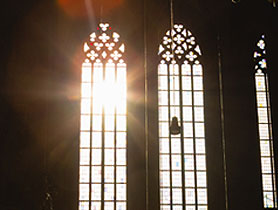January 7, 2011
"Be Not Afraid" - Is Our Role Business or Faith?
 Jesus said to us “be not afraid” and yet we are afraid. We, in religious communities, are afraid that we will run out of money, run out of people, run out of energy. If our focus was on formation, not on maintaining the status quo, I believe we would be less afraid.
Jesus said to us “be not afraid” and yet we are afraid. We, in religious communities, are afraid that we will run out of money, run out of people, run out of energy. If our focus was on formation, not on maintaining the status quo, I believe we would be less afraid.
What would be different now if our vestries had led us in an exploration of the needs of the local community? What would we have learned if we had our time meeting, loving, welcoming, and addressing the needs of our neighbors?
Jesus said to us to take care of those who are hungry, thirsty, alone, without clothes, ill, or in prison. If our focus was on God’s mission, not on maintaining the status quo, I believe we would be known in our communities as places that show God’s love.
I mused afresh on all of this after reading an article by Tom Ehrich of Morning Walk Media , proposing that the time for "business as usual" in Episcopal parishes is over. Writing in Vestry Papers, a web newsletter produced by the Episcopal Church Foundation, Ehrich writes that historically vestries have failed to note the way that markets have changed, and, have failed to change with society.
Ehrich's marketing advice is sound but my response is radically different. He suggests that:
Many vestry members start out with three assumptions:
-Their job is to run the congregation
-Their goal is to keep longtime members happy
-From work and home, they already have the skills they need to do vestry work.
None of these assumptions is accurate. And our own history proves it.
Unlike Ehrich, I don’t think that marketing is our biggest mistake.
Imagine if, 40 years ago, or now, our vestries declared that the work of the church is to form Christians. Imagine if we were trying to learn how to reach out to those in need, to stand up for the oppressed, and to proclaim the Good News of Jesus Christ in the world. Imagine if we anticipated change, and vestries focused on helping us to prepare for that change?
What would be different now if our vestries had engaged in formation, and set up similar opportunities for the congregation? What would we have learned if we had spent years struggling to understand God's call to us each as individuals, and God's call to our congregation as a community?
Our individual churches are anxious about buildings, church attendance, and budgets. Our vestries are trying to run a business and think that our clients are the members of the church. Like Ehrich, I have a list of different jobs for the vestry.
-Vestries need to stop running churches, and begin listening for, and helping to implement, God's mission in the world.
-Vestries need to take risks and make a radical commitment to change steeped in what they learn about God through the work of formation, and in what they learn about communities in the work of outreach.
-Vestries need to discern their spiritual gifts, and to help members find theirs, and engage in training to use those gifts. The vestry should ensure that the whole community is engaged in ministry, learning to listen for God, and learning to follow God's path.
I don't actually know if following God's path would mean that the Episcopal Church, or any other denomination, would be larger in numbers than we are today. But I believe we'd be deeper in faith.
I believe that we would see the few fishes and loaves of bread in front of us as opportunities for mission instead of as a shortage of supplies. The work of the vestry isn’t keeping the Church going, but rather keeping the people of God heading toward God's reign.
We cannot do that by ignoring a changing world, or by keeping existing members happy. There is nothing wrong with good business practice, but the real work of the church is not business, but faith. We need to look inward, at who we are as a Christian community, and by looking outward, attend to the needs of those at the edges of society.
Reprinted with permission, Episcopal Divinity School's 99Brattle blog.





